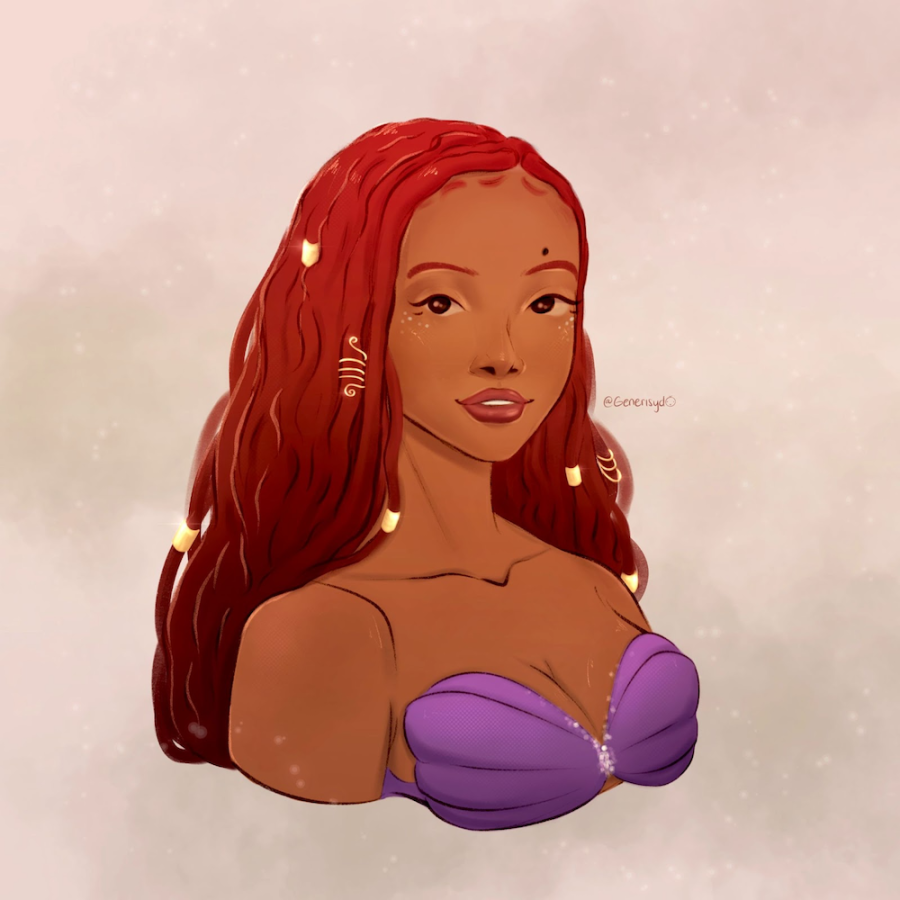‘The Little Mermaid’ will offer a window into a new world
How Halle Bailey’s portrayal of Ariel positively impacts Black girls and women.
May 5, 2023
The release of the new live-action “The Little Mermaid” on May 26 may not appeal to everyone, but it will definitely capture the eyes and hearts of many young girls who love the tale of Ariel’s adventures.
Many have praised newcomer Halle Bailey for her enchanting vocals and look forward to seeing her upcoming performance when the film hits theaters. Critics and fans alike — especially those in Black and Brown families — have been excited about the new release, and some have even recorded and posted the reactions of their Black kids getting to see Ariel as a princess who resembles them for the first time.
I myself enjoyed the trailer, and seeing the joy on kids’ faces in those reaction videos was endearing as a viewer. It made me reflect on my and my peers’ experiences with representation, and how so many Black girls were unable to relate to Disney princesses growing up.
Growing up, I found Princess Tiana, the protagonist of “Princess and the Frog,” to be one of my favorite Disney princesses. She remained driven and true to herself, despite forces attempting to hold her back, all while being intelligent, funny and beautiful. But she, the only Black princess on Disney’s official list, was turned into a frog, and remained that way for the majority of her film.
Since then, I and other Black girls have wondered: What would it have been like to see a princess who was visibly Black throughout the entire movie? Now, we finally can.
Adama Sall, a sophomore at the Tisch School of the Arts, said that her choice to major in Drama was based on seeing the significant lack in representation of Black people. She was inspired by seeing one of her old teachers performing on stage.
“The first inkling of me wanting to become a performer came from me seeing someone that looked like me, in person, doing the thing… it’s something that’s already in me, I just gotta let it shine,” Sall said.
Halle Bailey’s casting has been on many people’s radars for many over the years since her casting in 2019, and seeing the trailer filled new audiences with excitement.
“The acting in her eyes, the longing in her voice, her little quirks and harmonies she added, it was perfect,” said Steinhardt sophomore Ekene Onukogu. “She truly embodied the essence of a Disney Princess.”
Representation in media also played a large role in Onukogu’s choice of study, as growing up surrounded by the lack of darker-skinned Black actresses motivated her to aim for a career in the field. She also acknowledged that, while it’s important to see Black people pursuing careers in STEM fields, as they only make up 9% of jobs in STEM, it’s also important to consider careers in the entertainment and media industries.
“Yes, Black people can be academic and intellectual going into STEM fields but it’s also so important to see yourself in the media you consume,” Onukogu said. “When you’re coming back from the office or the hospital, you don’t wanna turn on the TV and be alienated by shows that are clearly not written with you in mind.”
According to Mame Toure, a junior NYU Tisch Film and Television major, Bailey’s role in “The Little Mermaid” will help in opening new doors for more actors of color and normalize diversity in the entertainment industry, especially for roles that don’t have a particular culture or skin tone attached to the storyline.
“Soon you’re gonna be seeing more [actors] that look like you,” Toure said. “You don’t need to feel bad about not looking like them. Soon you’re gonna see people with curly hair, [and] type 4C hair.”
While some are ecstatic about the new depiction of the movie, others have displayed bouts of contempt, creating the #NotMyAriel tag and stating that it takes away “redhead representation,” or questioning, “what if the roles were reversed?” The thing is, we don’t need to imagine a world where the roles are reversed — we already live in one.
Hollywood has a long history of white-washing. Take, for example, “Ghost In the Shell,” wherein Japanese character Motoko Kusanagi is played by white actress Scarlett Johansson. Or, as another, there is the casting of Judith Hoag as April O’Neil in “Teenage Mutant Ninja Turtles”, a character originally written as a mixed-race woman, whose appearance was based on creator Kevin Eastman’s then-girlfriend April Fisher.
In an interview with The Face, Bailey said that as a Black person, she’s not surprised by the hate anymore. She added that many don’t realize the positive impact this movie will have on young Black girls and the Black community as a whole.
“People don’t understand that when you’re Black there’s this whole other community,” Bailey said. “It’s so important for us to see ourselves.”
Both Onukogu and Sal agreed, with the former asserting that, “Despite the racists coming out in full force, I know Halle will rise — er, swim, above it, and it will thrust her into true superstardom.”
“I know that there’s gonna be some little Black girl that sees the movie, and she’s like ‘I can do this, I really am a princess,’ and that goes further into believing that you’re beautiful too,” Sal said. “Keep believing. Sometimes you have to keep pushing until you are that representation.”
Contact Sydni Johnson at [email protected].
























































































































































